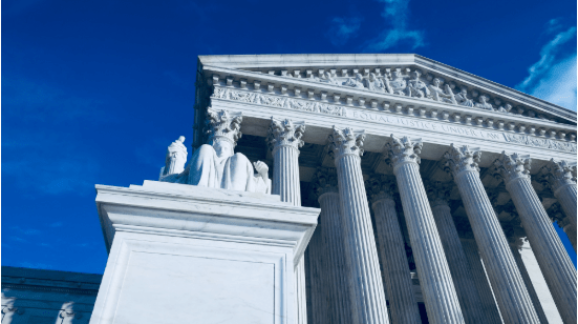The Supreme Court Gets Another Chance to Rein in the Administrative State
In Axon v. Federal Trade Commission, the constitutionality of executive agencies’ independent kangaroo courts is once again before the Supreme Court.
The Constitution vests its executive power in the president of the United States. But in the 1935 case of Humphrey’s Executor v. U.S., the Supreme Court ruled that Congress could shield the heads of executive agencies imbued with “quasi-legislative and quasi-judicial” powers from removal-at-will by the chief executive.
Thus was born one of the most anti-democratic principles in American constitutional law: An agency that exercises executive powers must be controlled by the president, but an agency that exercises all three powers of government must be controlled by nobody.
On November 7, 2022, the Supreme Court will hear a challenge to the constitutionality of this scheme, in which agencies act as rule-maker, investigator, prosecutor, and judge all in one. In the case of Axon v. Federal Trade Commission, defendants subject to agency proceedings are seeking relief from such proceedings before the conclusion of the proceedings themselves, which they argue are inherently unconstitutional.
The narrow question before the Court is whether the congressional statutes creating these agencies bar constitutional challenges in district courts by requiring lengthy administrative appeals of an agency’s final decision before the decision can be subjected to judicial review. Critics argue that if the answer to that question is yes, then the statutes violate the Constitution’s separation of powers.
Such agencies can impose onerous requirements and penalties on defendants even before issuing final orders, sometimes costing them millions and causing them irreparable harm. In this case, Axon, maker of tasers and other technologies used by military and law-enforcement personnel, acquired a virtually insolvent competitor for $13 million. About a month later, the FTC sent Axon a letter raising antitrust concerns and began subjecting the company to interminable investigatory demands. In a matter of months, the company had racked up more than $1 million in legal fees, and the following year it offered to walk away from the acquisition altogether. The FTC rejected that offer and demanded that Axon transfer its intellectual property to the subsidiary prior to any divestiture, threatening a full-blown administrative proceeding if it did not comply.
Compliance with the FTC’s demands could have bankrupted Axon, so the company asked a federal district court to intervene. The same day, the FTC initiated its administrative proceeding, and asked the district court to dismiss Axon’s lawsuit until the agency had conducted an internal adjudication of its own conduct. The district court agreed to do so, a federal court of appeals affirmed that ruling, and after Axon appealed again, the Supreme Court granted certiorari.
This is not just a matter of the FTC’s arbitrary persecution of yet another good American company; it impacts all Americans. The FTC is using these unconstitutional powers to interfere with innovative and pro-competitive business arrangements. That the quaint economic nonsense of mid 20th-century antitrust enforcement is coming back in fashion would be bad regardless, but it couldn’t be happening at a worse time: The bottom of a business cycle — especially a recession — is precisely when a rapid and efficient reallocation of resources is most needed. Federal and state antitrust enforcement are striving to freeze the economy in a downward spiral.
The FTC claims that the target of its investigation will eventually have its day before the agency’s own tribunal. But not surprisingly, in those kangaroo-court proceedings, the agency wins virtually every time. In fiscal year 2014, the SEC “won” every case in its internal court but only prevailed in 61 percent of its cases before federal courts. In a recent 20-year period, the FTC’s internal tribunals ruled to uphold every one of the agency’s decisions imposing liability on a defendant, and to reverse every decision that did not impose liability on a defendant.
Read the full article at National Review.
